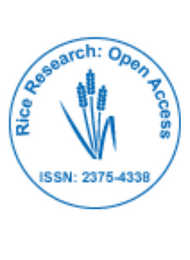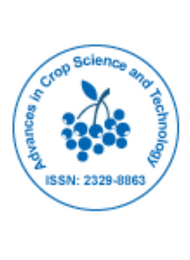Theme: Exploring the Future Advancements in the field of Agricultural Sciences
Organic Farming 2023
- About Conference
- Sessions & Tracks
- Target Audience
- Market Analysis
- Abstract Submission Criteria and Eligibility
- Participation Options and Benefits
Welcome to Organic Farming 2023!
For the benefit of the Organic Farming 2023 Organizing Committee, we enjoy extraordinary welcoming all members from around the world to go to the "2nd International Conference on Agroecology and Organic farming" to be held from October 25-26 Montreal, Canada, on the topic "Exploring the Future Advancements in the field of Agricultural Sciences".
Why take an interest?
The features of this gathering include ongoing research on innovations and methods, reasonable horticulture and coordinated agribusiness, crop improvements, the most recent developments in soil and plant science, horticulture, and organic farming. Introduce people, disperse knowledge, promote organization with present and incoming qualified pros, and stir up a commotion with the most recent advancements and gratitude for participating in this second day opportunity. Your participation at Agribusiness Organic Farming 2023 encourages you to move, learn, and adopt improved approaches to handle the continued development of skilled career opportunities in horticulture and natural teaching.
Why To Attend:
elite lecturers and emerging new farming gifts from around the world. Full Calendar: gathering with many tracks, studios, a presentation area, and more. to gain knowledge of the newest developments and advances in the domains of agriculture-food, aquaculture, and coordinated agribusiness farming. to develop your skills and potential in soil management, crop development, and yield improvement. to grow your business with like-minded experts in horticulture, plant science, and sanitation to provide you with the tools you need to fill the gap left by the public's lack of members.
Agroecology is a logical discipline, a bunch of practices and a social development. As a science, it concentrates on how various parts of the agroecosystem connect. As a bunch of practices, it looks for feasible cultivating frameworks that streamline and settle yields. As a social development, it seeks after multifunctional jobs for horticulture, advances civil rights, supports personality and culture, and reinforces the monetary feasibility of country regions. Family ranchers are individuals who hold the devices for rehearsing Agroecology. As a rural practice, agroecology imitates regular cycles to convey self-supporting cultivating that grows a more prominent variety of yields, definitely diminishes counterfeit data sources (pesticides, composts, anti-toxins) and reuses supplements (plant and creature squander as excrement). These practices have clear advantages for ranchers – diminished information costs, more prominent independence from organizations, differentiated revenue sources, hazard the board for crop failures and shifted produce to further develop nutrition.
Track 2:Principles of Organic Agriculture
Organic farming is the method of crop and livestock production that involves much more than choosing not to use pesticides, fertilizers, genetically modified organisms, antibiotics and growth hormones. In other words, it is referred to as, low input farming and uses natural sources of nutrients such as compost, crop residues and manure, and natural methods of crop and weed control, instead of using synthetic or inorganic agrochemicals.
Organic farming may be adopted to achieve the following benefit
- To increase genetic diversity
- To promote more usage of natural pesticides
- Ensure the right soil cultivation at the right time
- Keep and build good soil structure and fertility
- Control pests, diseases and weeds
METHODS OF ORGANIC FARMING
1. Soil management
2. Weed management
3. Mulching
4. Mowing or Cutting
5. Crop diversity
6. Monoculture
7. Controlling other organisms
8. Raising Livestock Farming
9. Genetic modification
We should practice organic agriculture in a careful and responsible manner to benefit the present and future generations and the environment with food supply.
IIntegrated farming (commonly known as mixed farming) is a farming system with continuous activities including animal and crop. Integrated agriculture includes systems of farm with economic, environmental, social, and intergenerational sustainability. In an integrated and sustainable agriculture system the goal is not necessarily producing immediate outputs, but rather it maintains a system of healthful production, over time. The major components of a sustainable system include community, environment, and economy. This mixed farming system recycles all wastes so that little is thrown away: someone’s waste is indeed another’s food.
The resource that must be managed in such a way that it takes all of these related components into account. Economically, the farm works full fill the
sound manner, with the preservation of natural resources including water, soil and air. The operations also sustainably provide access to food to everyone in the community, which allows for opportunities for cooperative relationship.
Plant pests and diseases can wipe out farmers’ hard work and cause significant losses to yields and incomes, posing a major threat to food security. Globalization, trade and climate change, as well as reduced resilience in production systems due to decades of agricultural intensification and biodiversity loss, have all played a part in the dramatic increase and spread of trans boundary plant pests and diseases. Pests and diseases can easily spread to several countries and reach epidemic proportions. Outbreaks and upsurges can cause huge losses to crops and pastures, threatening the livelihoods of farmers and the food and nutrition security of millions at a time.
Crop rotation means changing the type of crop grown on a particular piece of land from year to year. As used in this manual, the term includes both cyclical rotations, in which the same sequence of crops is repeated indefinitely on a field, and non-cyclical rotations, in which the sequence of crops varies irregularly to meet the evolving business and management goals of the farmer. Good crop rotation requires long-term strategic planning. Crop rotation is the practice of growing a series of dissimilar or different types of crops in the same area in sequenced seasons. It is done so that the soil of farms is not used for only one set of nutrients. It helps in reducing soil erosion and increases soil fertility and crop yield.
Track 5:Sustainable Agriculture
The goal of sustainable agriculture is to meet society’s food and Agri, food, Aqua needs in the present without compromising the ability of future generations to meet their own needs. Practitioners of sustainable agriculture seek to integrate three main objectives into their work: a healthy environment, economic profitability, and social and economic equity. Every person involved in the food system-growers, food processors, distributors, retailers, consumers, and waste managers-can play a role in ensuring a sustainable agricultural system. Soil health plays an essential role in raising healthy, productive crops and livestock. The many benefits of cover crops are increasingly appreciated among farmers. They play an important role in erosion control, weed control, soil conservation and soil health. With careful selection and management, they fit into any crop rotation or cropping system, such as no-till farming, and are integral to organic farming.Increase profitable farm income Promote environmental stewardship Enhance quality of life for farm families and communities Increase production for human food and fiber needs.
Track 6:Organic Farming Vs Conventional Farming
Organic farming is a specific type of agricultural production which is used to produce fiber and food which restricts farmers from using harmful synthetic pesticides. Organic Agriculture is an ecological production management that encourage and enhances Biological cycles, biodiversity and soil biological activity. All produce meat, grains, dairy, eggs and fibres must be derived in a organic way. An organic farmer depends on increasing biological diversity in the field to disrupt habitat for pest organisms, and maintain soil fertility. By allowing farm animals access to the outdoors and feeding them 100% organic food, a healthier farm system is created for human, animals and the environment. Certified organic refers to agricultural products that have been grown and developed according to uniform standards, and must be verified by organizations that have been accredited by the USDA.
|
Conventional Farming |
Organic Farming |
|
Centralization |
Decentralization |
|
Dependence |
Independence |
|
Competition |
Community |
|
Domination of nature |
Harmony with nature |
|
Specialisation |
Diversity |
|
Exploitation |
Restraint |
Plant Genomics is the part of molecular biology working with the structure, function, evolution, and mapping of genomes in plants. Genomics is the study of genes, their expression and their activities, the role played in biology. Genomics is a branch of genetics that is concerned with the sequencing and analysis of organism's genome. Genomics aids us in maintaining the large number of database that assists us to study genetic variation.
Track 8:Agricultural Biotechnology
Many new plant varieties being developed or grown by farmers have been produced using genetic engineering, which involves manipulating the plant's genes through techniques of modern molecular biology often referred to as recombinant DNA technology. These techniques are included in what is often referred to as "biotechnology" or "modern biotechnology. Assessing the environmental safety of a biotech plant requires an understanding of the biology of the plant itself and the practices used in its cultivation. This knowledge is important in identifying and evaluating potential environmental. The development of an effective national biosafety system is important to encourage the growth of domestic biotechnologies; to ensure safe access to new products and technologies developed elsewhere; and to build public confidence that products in the marketplace are safe. risks and also in designing any appropriate risk management measures.
Farmers Benefit from Agricultural Biotechnology Seeds. Decades of documented evidence demonstrates that agricultural biotechnology is a safe and beneficial technology that contributes to both environmental and economic sustainability. Farmers choose biotech crops because they increase yield and lower production costs.
Soil management is an integral part of land management and may focus on differences in soil types and soil characteristics to define specific interventions that are aimed to enhance the soil quality for the land use selected. Good soil structure improves water infiltration and decreases runoff and erosion. Well-structured soils are porous and allow water to enter easily, rather than running off to be lost to streams and rivers. Specific interventions also exist to enhance the carbon content in soils in order to mitigate climate change. Reversing the degradation of soil, water and biological resources and enhancing crop and livestock production through appropriate land use and management practices are essential components in achieving food and livelihood security.
Track 10:Horticulture & Agronomy
Horticulture is the study of agriculture that deals with the art, science, technology, and business of fruits, vegetables, flowers and ornamental plants. It includes production, improvement, marketing and scientific analysis of medicinal plant, fruits, vegetables, nuts, seeds, herbs, sprouts, mushrooms, algae, flowers, seaweeds and non-food crops such as grass and ornamental trees and plants. It also deals with species conservation, landscape restoration, landscape and garden design, management, and maintenance, research and marketing. Horticulturists apply their knowledge, skills, and technologies to grow plants for human food and non-food uses like garden or landscape design, decorations etc. Their field also involves plant propagation and tissue culture to improve plant growth, diversification, quality, nutritional value, and resistance and adaptation strength to environmental stresses. Major horticulture sections are Arboriculture, Turf management, Floriculture, Landscape horticulture, Olericulture, Viticulture, Oenology, Postharvest physiology.
Organic Farming focusses on the Livestock/Animal Farming. Animal Farming is described as "studying the biology of animals that are under the control of humankind." It can also be described as the production and management of farm animals. Historically, the degree was called animal husbandry and the animals studied were livestock species, like cattle, sheep, pigs, poultry, and horses. Today, courses available now look at a far broader area to include companion animals like dogs and cats, and many exotic species. Nowadays stress management is also a part of livestock farming as it finally improve product yield and quality. Pigs and poultry are reared intensively in indoor environments. However, indoor animal farming has often been criticized for multiple reasons - on grounds of pollution and for animal welfare reasons.
Livestock farming plays a major role in the agricultural business and economy of major developing countries. They take an important part in crop agriculture. Most farms in the developing world are too small to avail tractor or other machinery facilities and their main alternative is animal power. The innumerable benefits of livestock farming can positively effect in a growth of agronomy, agro-economy, biological ecosystem and other agricultural fields.
Track 12:Food and nutrition security
A policy orientation for food security and safety include state-wise, previous, current and future policy issues, and cope-wise sustainability of agriculture. The particular part of food distribution in our society can be examined through the research of the changes in the food supply chain. Globalization, in particular, has significant effects on the food supply chain by validating scale effect in the food distribution industry. Provision of an adequate amount of essential nutrients to human beings has ever been the challenge in the province of food security. Hence, malnutrition is heavily interlinked to food security consideration, yet difficult to be eliminated. food security and policy, therefore, become magnetic in the province of research.
Track 13:Agricultural waste management
An agricultural waste management system (AWMS) is a planned system in which all necessary components are installed and managed to control and use by-products of agricultural production in a manner that sustains or enhances the quality of air, water, soil, plant, animal, and energy resources. The primary objective of most agricultural enterprises is the production of marketable goods. To be successful, the farm manager must balance the demand on limited resources among many complicated and interdependent systems, often including six basic functions : Production, Collection, Transfer, Storage, Treatment, Utilization.
Track 14:Agricultural engineering
Agricultural Engineering is the area of engineering concerned with the design, construction and improvement of farming equipment and machinery. Agricultural engineers integrate technology with farming. For example, they design new and improved farming equipment that may work more efficiently, or perform new tasks. They design and build agricultural infrastructure such as dams, water reservoirs, warehouses, and other structures. They may also help engineer solutions for pollution control at large farms. Some agricultural engineers are developing new forms of biofuels from non-food resources like algae and agricultural waste. Such fuels could economically and sustainably replace gasoline without jeopardizing the food supply.
Bio-fertilizer technology has shown promise for integrated nutrient management through biological Nitrogen fixation (BNF). Bio-fertilizers may also be used to improve Phosphate availability to crops. The efficacy of inoculants can vary with inoculant type, crop species, formulation, soil nutrient level, soil pH/type, existence of relevant microbes in the soil, and weather conditions. Bio-fertilizers are living organisms that enrich the nutrient quality of the soil. It refers to the use of microbes instead of chemicals to enhance the nutrition of the soil, it is also less harmful and does not cause pollution.Main roles of bio-fertilizers:Make nutrients available.Make the root rhizosphere livelier.
Growth-promoting substances are produced.More root proliferation.Better germination.Improve the quality and quantity of produce.Improve the fertilizer use efficiency.Higher biotic and abiotic stress tolerance.Improve soil health.Residual effect.Make the system more sustainable“Biofertilizers are the product containing carrier based (solid or liquid) living microorganisms which are agriculturally useful in terms of nitrogen fixation, phosphorus solubilization or nutrient mobilization, to increase the productivity of the soil and/or crop"Biofertiliser applications : Seed treatment | Seedling root dip treatment | Soil treatment
- Faculty of Agricultural Sciences, Students, Scientists
- Faculty of Plant Sciences, Students, Scientists
- Faculty of Animal Sciences, students, scientists
- Universities of Soil Sciences and Agriculture
- Scientists in forestry and landscaping
- Agricultural and plant associations and societies
- Entrepreneurs and exhibitors
- Research and training institutes
- Seed science and weed management researchers
- Experts in soil science and soil-plant nutrition
- Agriculture and food security
- Agricultural device manufacturing companies
- R&D laboratories, chemical and fertilizer industries
- Media partners and collaborators
- International delegates and world observers
- Students and young researchers
Traditional farming techniques based on naturally occurring biological processes are combined with modern technology and ecological science in productive agriculture and organic farming approaches. Recent advancements in fertilizers’, chemicals, and seeds have made it possible for agricultural producers to keep up with the world's population's expanding demand for food. Despite the sharp advances in agricultural production, the agricultural sector has more hurdles than ever before in providing the expanding global economy with adequate supplies of agricultural staples.
Scope and importance
The basic principle in the organic farming system is to produce maximum yield with the highest possible quality. At the same time, it should not affect the soil fertility, soil health, and environment. Due to the extensive use of chemical fertilizers, there is a huge toll on humans with the poisonous effects. Hands more and more people are in search of organic fruits and vegetables. Hence there is a steep increasing the demand of organic farming system for Organic fruits, vegetables, and foods.
Why to Attend ???
The significance of agriculture in human life is significant. Agriculture and agricultural products are essential for us. Food, energy, medicine and so many things we are able to get from agriculture. This conference seeks to bring all such scientist, Noble Laureate, researcher, research scholar, students and people together who are involved in this field and provide them to discuss their innovation, exchange ideas and interact with each other
Participating authors are answerable for registration, travel, and hotel costs. Note: Those with submitted abstracts will get an acknowledgment mail enabling them to enroll for the gathering.
Abstracts will be compiled, and conference books are made available to participants at the conference.
Any presenter who is unable to attend should arrange for another qualified individual to present the paper/poster in question. If such a change is necessary, please notify our conference team
Oral paper introductions will have 30-minute schedule time slot. The keynote session will have for 45-minute presentation duration, workshop/special session will have 1-hour long schedule opening and symposium will have 1-hour long availability followed by 5-minute Q&A session.
Graduate and master’s understudies are qualified to present their abstracts under poster and e-poster presentation category.
Ph.D. understudies are qualified to submit their abstract under special YRF (Young Researcher's Forum), poster and e-poster presentation category.
NOTE: YRF category includes short oral presentation especially for Ph. D. students
Extended abstract: Submissions should utilize the Abstract Template. Papers submitted in this category may represent original empirical research, theoretical development, reviews, or critiques.
PARTICIPATION OPTIONS: Nursing Conference provides the participants with different modes or ways to participate such as Delegate or Speaker under either ACADEMIC / STUDENT / BUSINESS Category. Mode of participation is Online through Power Point Presentation/ Video Presentation on Cisco Webinars.
- Keynote speaker: 45-50 minutes
- Speaker (oral presentation): 25-30 minutes (only one person can present)
- Speaker (workshop): 45-50 minutes (more than 1 can present)
- Speaker (special session): 45-50 minutes (more than 1 can present)
- Speaker (symposium): more than 45 minutes (more than 1 can present)
- Delegate(only registration): will have access to all the sessions with all the benefits of registration
- Poster presenter: can present a poster and enjoy the benefits of delegate
- Remote attendance: can participate via video presentation or e-poster presentation
- Exhibitor: can exhibit his/her company’s products by booking exhibitor booths of different sizes
- Media partner
- Sponsor
- Collaborator
For more details about each mode, kindly contact: https://organicfarming.plantscienceconferences.com/
Benefits of Joining Conference :
- Get your abstract published with DOI
- Get Certified for your participation
- Reduced Costs Affordability
- Knock Down Geographical Barriers
- Convenience from comfort of your own home or from work
- They’re Archived: Ability to view events in the recording
- Great resource for learning new career skills
- Learn from the Pros
- Global exposure to your research
- Make new connections
- Significant time saving
- Increased engagement
- Wider Reach
- More Engaging
- Position yourself as the expert
- Get your abstracts published with unique DOI in International Journals
- Get up to 50% discounts for publishing your entire article in our open access International Journals
- Get Handbooks and conference kits
- Get an access to the network with eminent personalities from worldwide.
Conference Highlights
- Agroecology
- Principles of Organic Agriculture
- Integrated farming
- Crop Protection
- Sustainable Agriculture
- Organic Farming Vs Conventional Farming
- Plant Genomics
- Agricultural Biotechnology
- Soil management
- Horticulture & Agronomy
- Livestock Farming
- Food and nutrition security
- Agricultural waste management
- Agricultural engineering
- Bio-fertilizers
To share your views and research, please click here to register for the Conference.
To Collaborate Scientific Professionals around the World
| Conference Date | October 25-26, 2023 | ||
| Sponsors & Exhibitors |
|
||
| Speaker Opportunity Closed | |||
| Poster Opportunity Closed | Click Here to View | ||
Useful Links
Special Issues
All accepted abstracts will be published in respective Our International Journals.
Abstracts will be provided with Digital Object Identifier by











